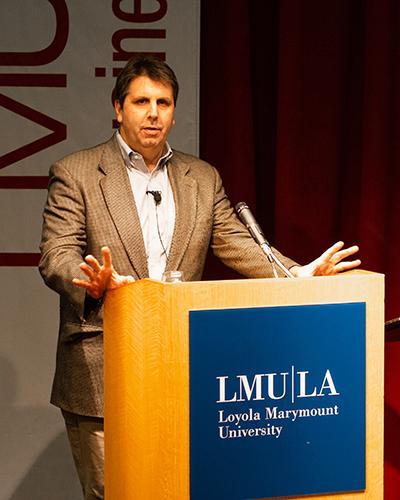
Hon. Mark Lippert, vice president of Boeing International and former U.S. Ambassador to the Republic of Korea, visited LMU on February 5, 2019 for a timely discussion titled “Changes, Opportunities and Concerns on the Korean Peninsula.”
Lippert started off with a brief update on the geopolitical landscape of Korea, explaining that as a result of factors like U.S. military presence, unresolved international issues between Korea and neighboring countries like China, and the proximity of nuclear weapons, the area has found itself becoming more and more volatile. He explained that while people tend to focus solely on the “cage-match” between North Korea and the United States, there is a plethora of other elements that must be acknowledged in order to understand the true reality of our relations.
Lippert covered the history of Korea, from its dynastic period up to post-Korean War and the formation of the Demilitarized Zone (DMZ) to the current state of North and South Korea. He discussed a number of the major problems that South Korea faces today, including economic slowdown, low birthrates and an aging population, and government corruption to name a few. He also talked about North Korean policy and their shift in tactics toward more asymmetrical threats like cyber-warfare and nuclear weaponry.
Lippert addressed the Kim regime and how Kim Jong Un, the third dictator after his father, Kim Jong Il and grandfather Kim Il Sung, has led his nation thus far. Unlike Kim Jong Il, Kim Jong Un has appeared to be much more reckless.
He then explained two processes meant to ensure the future safety of the Korean peninsula. The first is denuclearization; as the threat of nuclear warfare continues to loom, there is little possibility of peace until the said threat is removed. The second process is the proliferation and continuation of inter-Korean talks. If the two nations can somehow find a way to agree on unification or at least a true demilitarization at the border, then at the very least it will show progress toward peace.
Lippert concluded his lecture with a brief outlook on the future of Korean relations and what to be on the lookout for in the coming summit, as well as the notion that we should be wary of the U.S.’s current position in regards to these issues as it does not necessarily hold as much leverage as many people would assume.
Written by LMU student Gavin Toy.



